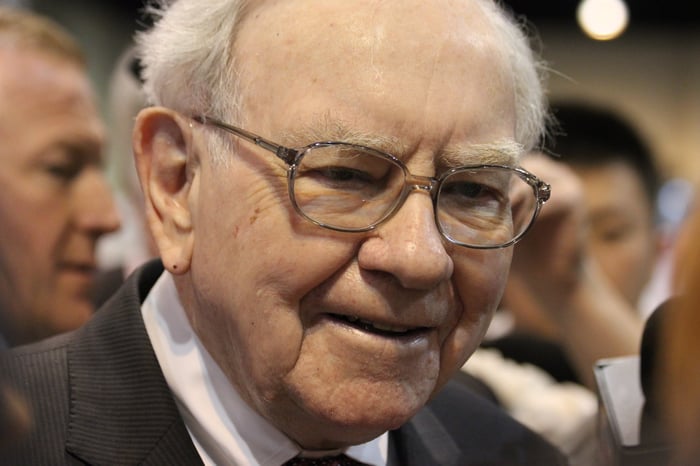When Berkshire Hathaway (BRK.A -0.55%) (BRK.B -0.32%) CEO Warren Buffett buys or sells stock, everyday investors and Wall Street professionals all pay close attention. That's because the Oracle of Omaha has led his company's Class A shares (BRK.A) to a jaw-dropping average annual return of 20.1% since taking the reins in 1965. For those of you keeping score at home, we're talking about an aggregate gain of 3,641,613% over 57 years, through the end of 2021.
The best news for investors is that following Buffett's trading activity, and riding his coattails, if you choose to do so, is pretty easy. That's because Berkshire Hathaway is required to file Form 13F with the Securities and Exchange Commission on a quarterly basis. A 13F provides an under-the-hood look at what money managers with at least $100 million in assets under management were buying, selling, and holding in the most-recent quarter.

Berkshire Hathaway CEO Warren Buffett. Image source: The Motley Fool.
Three sectors have captivated the Oracle of Omaha's attention for more than 20 years
Since the beginning of the century, predicting where Buffett would put his money to work hasn't been a mystery. That's because three sectors have dominated Berkshire Hathaway's portfolio for the better part of the past 22 years.
Although it's the current No. 2 in Buffett's portfolio, financial stocks are, unquestionably, Buffett's favorite sector to invest in. Even though banks and insurance companies are cyclical, and therefore exposed to the inevitable downturns that arise in the U.S. economy, they benefit from the disproportionate amount of time the U.S. spends expanding. This allows major holdings like Bank of America (BAC 0.75%) and U.S. Bancorp (USB 1.28%) to grow their loans and deposits over time. And it certainly doesn't hurt that bank stocks like Bank of America and U.S. Bancorp have a knack for paying superior dividends, relative to the average yield of the benchmark S&P 500.
The Oracle of Omaha is also a huge fan of consumer staples stocks. These are companies that provide goods and services that people will consume no matter how well or poorly the U.S. economy and stock market are performing. Beverage stock Coca-Cola (KO -0.01%), which is the longest-tenured holding in Berkshire Hathaway's portfolio, is an excellent example of a consumer staple stock that continues to grow over time. Because Buffett's company has been holding shares of Coca-Cola shares for 34 consecutive years, it's generating an eye-popping 54% annual yield, relative to its cost basis.
The third sector that Buffett and his investing team have piled into is technology. Although the Oracle of Omaha isn't the biggest fan of tech stocks, he's been known to make sizable bets on a select few companies. Innovative kingpin Apple (AAPL 0.51%) accounted for 42.6% of Berkshire Hathaway's $368.5 billion of invested assets, as of this past weekend. Apple has an easily recognized brand, an exceptionally loyal customer base, the top-selling smartphone in the U.S., and is delivering sustained double-digit sales growth from its high-margin subscription services segment.

Image source: Getty Images.
This is a first for Warren Buffett in this century
However, Berkshire Hathaway's latest 13F filing, which covers the company's buying and selling activity during the second quarter, revealed a big change. For the first time this century, the energy sector accounts for more than 10% of the Oracle of Omaha's invested assets -- 10.9%, as of June 30, 2022.
Even more interesting is the fact that only two energy stocks comprise the entirety of this 10.9% stake: Chevron (CVX -0.84%) and Occidental Petroleum (OXY -0.71%). Note, this percentage doesn't include the $10 billion in preferred stock Berkshire Hathaway owns of Occidental Petroleum.
For Buffett to aggressively pile into oil stocks like Chevron and Occidental signals his belief that oil and natural gas prices will remain elevated for a long time to come. There's certainly evidence to suggest that energy commodities can deliver big gains to drilling and exploration companies for years.
For example, oil majors substantially reduced their capital spending during the COVID-19 pandemic due to energy commodity price uncertainty and a historic drop-off in demand. Add to this Russia's invasion of Ukraine, which threatens to cripple the flow of oil and gas into certain parts of the world (e.g., Europe). These supply chain challenges aren't going to be resolved overnight, which sets the stage for oil and natural gas prices to stay well above their historic norms.
Buffett is probably also a big fan of Chevron and Occidental Petroleum as being integrated operators. "Integrated" oil and gas stocks generate the bulk of its profits from drilling, but also operate midstream and/or downstream assets. Midstream assets, such as transmission pipelines, offer transparent operating cash flow thanks to fixed-fee or volume-based contracts. Meanwhile, downstream assets, such as refineries and chemical plants, benefit from lower input costs and (generally) higher consumer/enterprise demand when crude oil prices decline. In other words, Chevron and Occidental are reasonably well-hedged in the event that oil and gas prices decline.
Big Oil is also known for its big dividends. Chevron has increased its base annual payout in each of the past 35 years and is currently doling out a 3.6% yield. Although Occidental's 0.7% yield is nothing to write home about, Berkshire does hold an aforementioned $10 billion in preferred stock yielding 8% per year.
Perhaps the biggest oddity of Buffett's new-found love of energy stocks is why he chose to pair Occidental Petroleum with Chevron. While Chevron has what's arguably the safest balance sheet among the global oil majors, Occidental Petroleum has one of the most-levered balance sheets in the industry thanks to its pricey acquisition of Anadarko in 2019. Occidental absolutely needs crude prices to remain elevated if it's going to dig itself out of a sizable net-debt position. Chasing after a company as indebted as Occidental is very un-Buffett-like.
For the moment, Buffett's new energy-focused investment strategy appears to be working. With the Oracle of Omaha getting permission from the Federal Energy Regulatory Commission to potentially increase Berkshire's stake in Occidental Petroleum to as much as 50%, energy has a chance to eventually supplant consumer staples as Buffett's third-biggest sector by invested assets.




